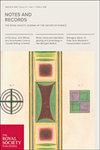Cetacean citations and the covenant of iron
IF 0.6
3区 哲学
Q3 HISTORY & PHILOSOPHY OF SCIENCE
Notes and Records-The Royal Society Journal of the History of Science
Pub Date : 2018-11-14
DOI:10.1098/rsnr.2018.0033
引用次数: 0
Abstract
By the early decades of the nineteenth century, with surveys established as the weapon of choice for the fiscal military state, their instrumentation provided a focal point for radical attacks on political establishments. This paper considers a notorious dispute over mastery of iron in the instrumentation of magnetic surveying that took place in the 1830s between an Admiralty committee and the Reverend William Scoresby, a whaler-turned-clergyman. Scoresby staked his claim by drawing on the labour law of the whaleboats, a culture peculiarly preoccupied with the properties of bone and blubber, ink and skin, parchment and iron, where magnetism was forged in the ‘combinations’, as Scoresby put it, of such specific materials. The enterprises of his most avid reader, peer and fellow labour rights activist, Herman Melville, showcase the salience of Scoresby's struggle with Admiralty authority. The eminent Australian scholar Greg Dening's approach to ethnohistory proves the appropriate instrument with which to analyse such an encounter between traditions, negotiated through material forms. In the fraught exchange between whaler and maritime state, the combination laws that helped prompt the threat of revolution in early nineteenth-century Britain were translated into Scoresby's iron. Extant material and archival collections in Greenwich and Whitby offer traces of a battle between ways of knowing this protean metal: ‘not down in any map; true places never are’.Cetacean引文与铁之约
到了19世纪初的几十年,随着调查被确立为财政军事国家的首选武器,他们的工具为激进攻击政治机构提供了焦点。本文考虑了19世纪30年代海军部委员会与捕鲸者出身的牧师William Scoresby之间发生的一场臭名昭著的关于磁性测量仪器中铁的掌握问题的争议。Scoresby通过借鉴捕鲸船的劳动法来表明自己的主张,捕鲸船是一种特别关注骨头和鲸脂、墨水和皮肤、羊皮纸和铁的特性的文化,正如Scoresby所说,磁性是在这些特定材料的“组合”中锻造而成的。他最狂热的读者、同行和劳工权利活动家赫尔曼·梅尔维尔的企业展示了斯科尔斯比与海军部权力斗争的突出性。澳大利亚著名学者Greg Dening的民族史方法证明了分析传统之间通过物质形式协商的这种相遇的合适工具。在捕鲸者和海洋国家之间令人担忧的交流中,在19世纪初的英国,有助于引发革命威胁的组合法被转化为Scoresby的铁。格林威治和惠特比的现存材料和档案收藏提供了了解这种变形金属的方式之间的斗争痕迹:“不在任何地图上;真正的地方从来都不是。
本文章由计算机程序翻译,如有差异,请以英文原文为准。
求助全文
约1分钟内获得全文
求助全文
来源期刊
CiteScore
1.50
自引率
0.00%
发文量
45
审稿时长
>12 weeks
期刊介绍:
Notes and Records is an international journal which publishes original research in the history of science, technology and medicine.
In addition to publishing peer-reviewed research articles in all areas of the history of science, technology and medicine, Notes and Records welcomes other forms of contribution including: research notes elucidating recent archival discoveries (in the collections of the Royal Society and elsewhere); news of research projects and online and other resources of interest to historians; essay reviews, on material relating primarily to the history of the Royal Society; and recollections or autobiographical accounts written by Fellows and others recording important moments in science from the recent past.

 求助内容:
求助内容: 应助结果提醒方式:
应助结果提醒方式:


